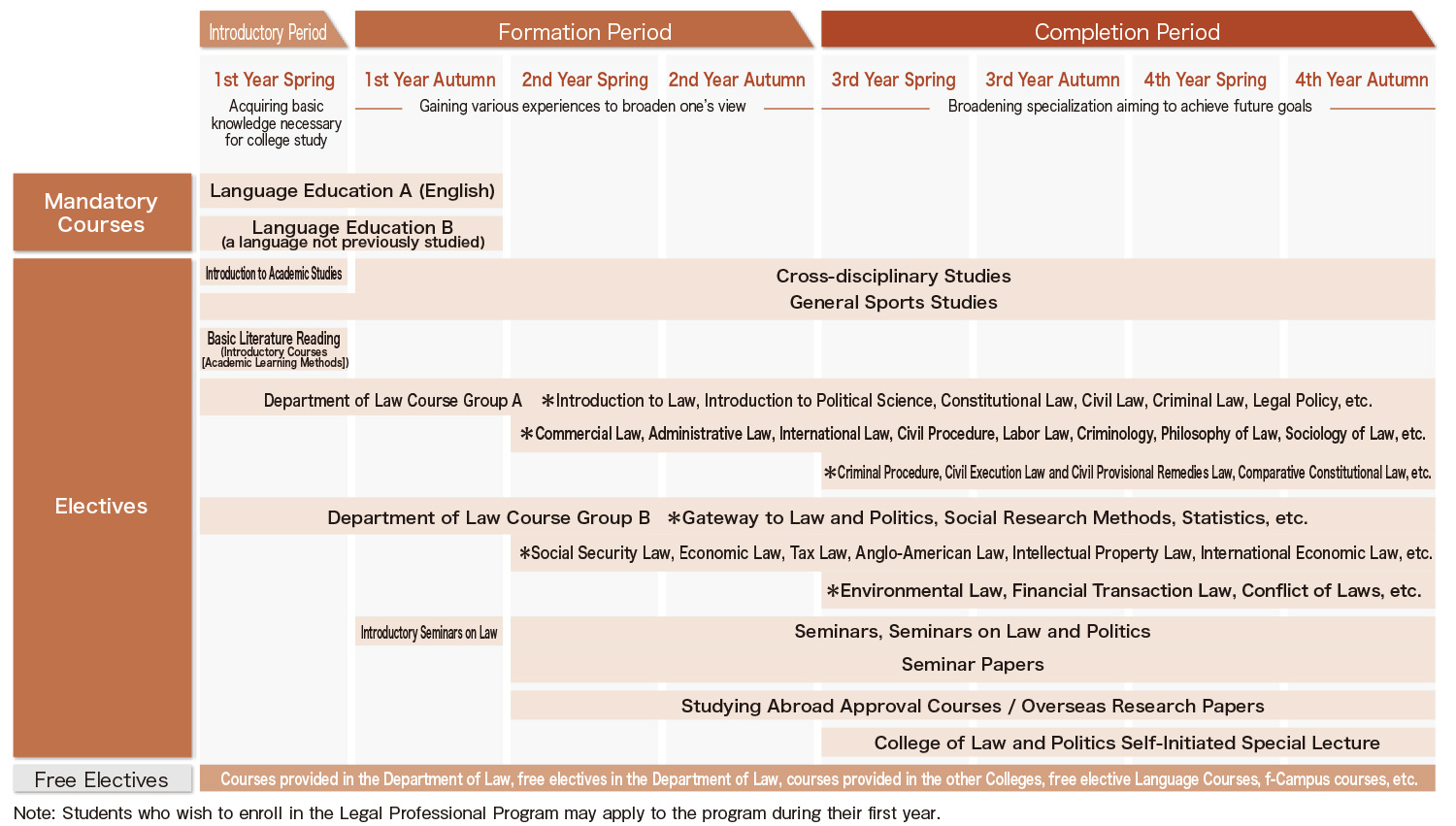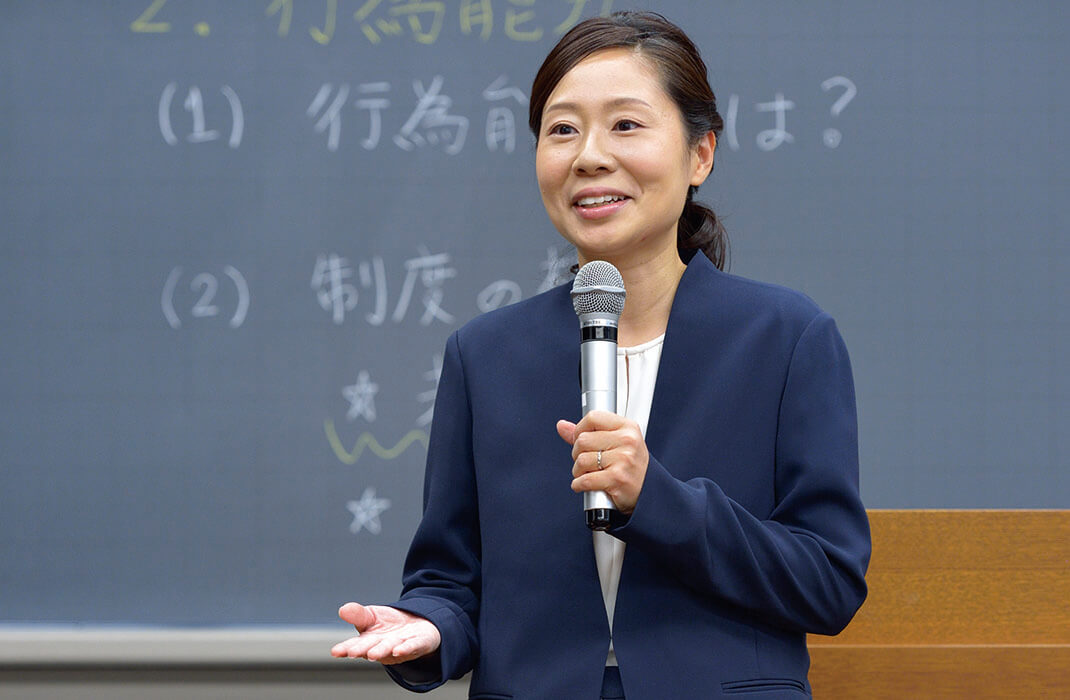Department of Law
We foster the abilities to reevaluate and resolve issues from a legal viewpoint and to create better-ordered social systems
Imagine what conflict resolution would be like in a society without laws. Outcomes would surely favor the powerful, and not just the physically strong but those with the financial resources to hire soldiers. A mafia movie may also give you some idea. The scenario would be quite dystopic. Laws exist to prevent people from relying on physical forces to resolve conflicts. While we may not live in an ideal world, laws are a crystallization of wisdom for building a better world.
Characteristic of the Department 1 / The Department of Law is not only for becoming a legal professional; it is for mastering the disciplines needed for handling legal matters
Studying law is not merely for those who wish to become judges, public prosecutors, and lawyers. Studying law is also beneficial for those who would like to work at local and national governmental offices and the legal departments of private companies. Learning law can also be useful for those who wish to work at NGOs or other similar organizations. It also serves you to become more sensible citizens in the society. At the Department of Law, students gain fundamental legal knowledge as well as a legal way of thinking. A branch of an academic area is called a discipline. The discipline of law is more established than other academic disciplines, such as that of literature or sociology. The existence of the national bar examination is an indication of the solidity of legal study as an independent academic discipline.
Characteristic of the Department 2 / The Department of Law also offers advanced learning based on foundational knowledge of law
The Department places significant weight on essay-style examinations in order to make sure that students acquire fundamental knowledge of law. However, the Department also offers small-sized classes as an advanced learning environment. With a limited number of participants in each class, students learn that there are no predetermined answers to any social issue through group discussion and debate. Small-sized classes are also beneficial to accommodate individual students’ academic interests. The Department of Law strives to not let students be confined to certain specialized fields, but rather to enable students to broaden their horizons and to wield skills in problem assessment, problem-solving, conflict prevention, and social system-designing.
Characteristic of the Department 3 / The Department of Law also produces talent for financial and other sectors
As stated above, the Legal Professional Program established by the Department of Law is not only for students who wish to become legal professionals. It is certainly a preparation for those who will go on to graduate law school and pursue that path. However, legal studies are also essential for working in specialized professions related to law, such as civil servants at the national or local level or employees in the legal departments of private companies. Learning law can also be useful for working at NGOs or other similar organizations. Private companies, especially those in the financial sector (banking, insurance, etc.), are intimately involved in legal issues. As a result, many graduates of the Department go on to work in the financial sector, as well.
The Department is suitable for those who wish to…
It is often said that you study something that has a single correct answer in a high school, while you study something that has no correct answer to at a university. This is generally true in the sense that there is often no single right answer to issues dealt with in legal education. However, there are definitely wrong answers. The national bar examination, the standard test on knowledge of law, is established to measure one’s ability to reach the point where right and wrong are decided without setting foot on the wrong side. The only way for you to train this ability is to build knowledge step by step. Although flashes of genius may do wonder, students who can put in steady effort will be especially well-suited for the Department of Law.
Four-Year Curriculum (offered in Japanese only)

For details about the Legal Professional Program, see ”Legal Professional Program and Early Graduation System”
Message from Academic Staff

Let us explore the evolving landscape of criminal law in response to the changing dynamics of the society.
Professor Shinya Fukamachi;Courses to teach : Criminal Law
Criminal law establishes which actions are considered“ crimes,” and specifies the appropriate penalties for them. Familiar offenses like“ murder” and“ robbery” have been recognized as criminal acts for quite some time, with a widely accepted understanding that they are morally wrong. However, there is an increasing demand for criminal law to address a range of challenging situations that frequently occur in daily life.
For instance, it is not unusual to send multiple emails or make numerous phone calls to someone you are interested in, or express negative opinions about someone you dislike online. However, when taken at extreme levels, such actions can lead to significant anxiety and emotional harm to the other person.The question then arises: when should such behavior be deemed“ excessive” and classified as a“ crime”? This issue is a widely debated topic not only in Japan but also in several other countries.
Moreover, there has been growing interest in recently recognized family issues that have been previously overlooked. For instance, a few decades ago, physical punishment of children by parents was viewed as "normal" (though not advisable). However, it is now explicitly prohibited under the Civil Code (Article 821) and is also considered a significant matter under the Criminal Code. Despite the home being a sanctuary for family members, there is always a risk of it turning into a "hotbed of crime." Family related crimes are poised to become increasingly critical areas of concern in the future. I look forward to delving into these issues with you through lectures and seminars to uncover insights to address them.
